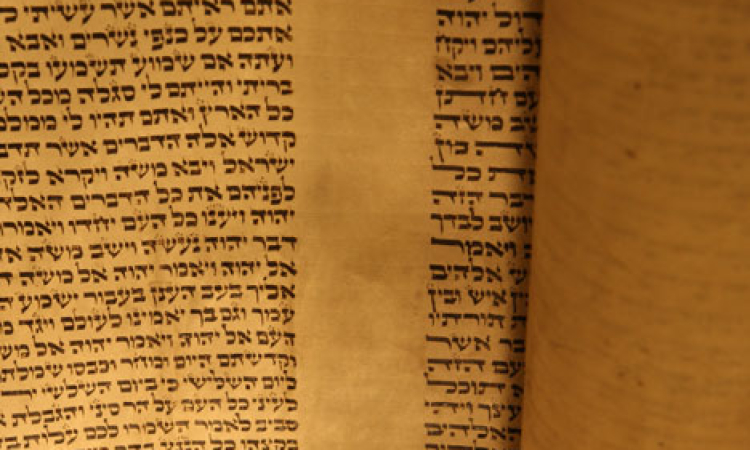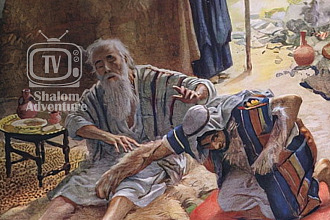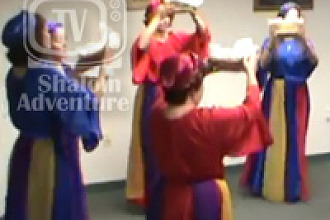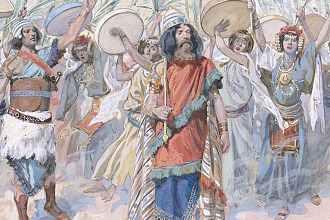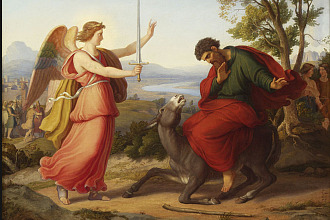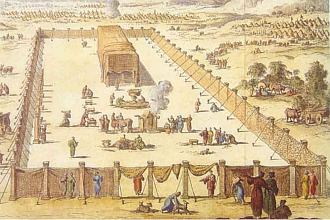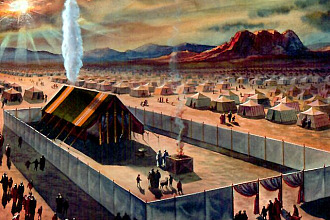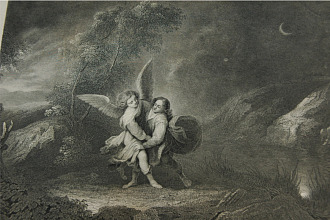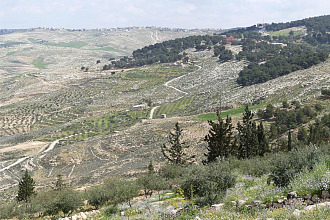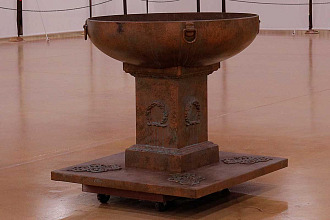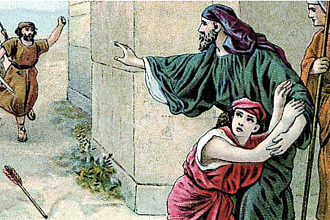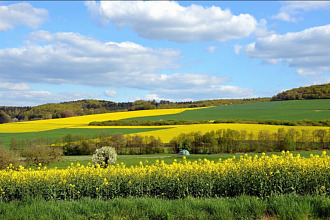Parasha for the Week: Ha'azinu: Deuteronomy 32:1 - 32:52
Special Readings for Rosh Hashana
1st Day: Genesis 22:1-34 & Numbers
29:1-6. Aftarah, 1 Samuel 1:1-2:10
2nd Day: Genesis 22:1-24 & Numbers
29:1-6. Aftarah, Jeremiah 31:2-20
Overview:
Almost all of Ha’azinu is a song, written in the Torah in two parallel columns.
Moshe summons the heavens and the earth to stand as eternal witnesses to what will happen if the Jewish People sin and do not obey the Torah. He reminds the people to examine the history of the world, and note how the Jewish People are rescued from obliteration in each generation—that G-d “pulls the strings” of world events so that the people of Israel can fulfill their destiny as His messengers in the world. G-d’s kindness is such that Israel should be eternally grateful, not just for sustaining them in the wilderness, but for bringing them to a land of amazing abundance, and for defeating their enemies. But, this physical bounty leads the people to become self-satisfied and over-indulged. Physical pleasures corrupt the morals of the people. They worship empty idols and powerless gods, and indulge in all kinds of depravity. G-d will then let nations with no moral worth subjugate Israel and scatter them across the world. However, their only purpose is as a rod to chastise the Jewish People. When these nations think that it is through their own power that they have dominated Israel, G-d will remind them that they are no more that a tool to do His will. The purpose of the Jewish People is fundamental —that man should know his Creator, all the nations should come to adore the true and only one G-d. Israel has not done that when they were in the Land of Israel, they will do it in exile, scattered among the nations they have to bring to G-d. Neither exile nor suffering can sever the bond between G-d and His people, and eventually in the final redemption this closeness will be restored. G-d will then turn His anger against the enemies of His people, as though they were His enemies, showing no mercy to the tormentors of His people.
G-d then gives His last commandment to Moshe: That he should ascend Mount Nebo and be gathered there to his people.
"Rain as Metaphor of Moses’ Teaching "
Part of Moshe’s poem reads, “My teaching shall drop as rain, my speech shall distill as the dew, as the small rain upon the tender grass, and as the showers upon the herb” (Deuteronomy 32:2). Why does Moses want his teachings to drop “as rain”? Water is a vital component of life. Rain is a vehicle for bringing water across the planet to places that otherwise would not have access to water. When rain falls on trees and plants, growth is not noticeable immediately. It takes time for the rain to have a visible effect. Likewise, when we give admonition to others or we make efforts to change ourselves, improvement is often not immediately noticeable. We should not despair nor give up hope. Every effort has an impact just as every raindrop has an impact. In time God’s work will bloom!
"The Almighty Knows What is Best for You"
The Torah states: “The Rock! His deeds are perfect for all His ways are just.” (Deut 32:4)
The Chofetz Chaim, Rabbi Yisroel Meir Kagan, once asked someone how things were going for him. Replied the man, “It wouldn’t hurt if things were a bit better.” “How can you possibly know that it wouldn’t hurt?” responded the Chofetz Chaim. “The Almighty knows better than you. He is merciful and compassionate. If He felt it would be good for you for things to be better, He definitely would have made them better. Certainly things are good for you the way they are.” Things are not always the way we wish them to be, but they are always for our good. This awareness will give you an elevated feeling in your life. You have every right to try to improve your situation. However, whenever you do all you can, and the situation is still not the way you would wish, work on internalizing the consciousness that the Almighty is doing for you what is in your best interest.
"Think Before Asking"
The Almighty told Moshe that he would not be allowed to enter the land of Israel, “...because you trespassed against me in the midst of the Children of Israel at the waters of Merivos-Kadesh, because you did not sanctify Me in the midst of the Children of Israel.” (Deut. 32:51)
The verse seems to be redundant. Rabbi Meir Simcha HaCohen explains that the concept of din (judgment) and heshbon (accounting) are being referred to in this verse. Din is the judgment for what one has done wrong —Moshe trespassed against the Almighty. The second part of the verse is the heshbon, that is, the calculation of what Moshe could accomplish if he would have done what was proper by speaking to the rock instead of hitting it. He would have had done what we call the Kidush Hashem, sanctification of God’s name instead of “you did not sanctify Me.” Before we act, we must consider the harm to God’s name.
"The Hand of the Almighty"
In the song of Ha’azinu it says: “Remember the days of old, understand the years of every generation.” (Deut. 32:7) What does understanding the “days of old” have to do with understanding “every generation”? Rabbi Mordechai Gifter, elucidated: “The Torah gives us guidelines for the viewing and understanding of history from a true perspective. If one wishes to comprehend an event in history, one cannot look at it in the limited scope of the finite here and now; rather, one must understand the event as having a place in the historical continuum. ”A historical occurrence extends itself beyond the isolation of time and space and reaches towards the past and future to acquire true significance. However, one must invariably begin with Creation and the Creator. As the Vilna Gaon explained, to understand ‘the years of every generation’ one must first ‘remember the days of old’ - the Six Days of Creation. For in those days lies the complete plan of the development of the universe and humankind in it.
"The Death of Moses"
The Torah states: “So Moses the servant of the Lord died there in the land of Moab, according to the word of the Lord. And He buried him in a valley in the land of Moab, over against Beth-peor: but no man knows of his sepulcher.” (Deut 34:5-6). Many who had been unwilling to heed the counsels of Moses while he was with them would have been in danger of committing idolatry over his dead body had they known the place of his burial. For this reason it was concealed from men. But angels of God buried the body of His faithful servant and watched over the lonely grave. “Never since has there arisen a prophet in Israel like Moses, whom the LORD knew face to face. He was unequaled for all the signs and wonders that the LORD sent him to perform in the land of Egypt, against Pharaoh and all his servants and his entire land, and for all the mighty deeds and all the terrifying displays of power that Moses performed in the sight of all Israel.” (Deut 34:11-12) [PP 477-478]
AFTARAH Hosea 14:2 – 10; Joel 2:15 – 27; Micah 7:18 - 20
We celebrated Yom Kippur and will start Succoth. For this special Shabbat between these two great celebrations Israel is going to read three texts for the Haftara, not only one.
Haftara: The text of Hosea is a call to come back to the Lord, we are still in the context of Teshuva (repentance and confession). “Take words with you and return to the LORD; say to him, “Take away all guilt; accept that which is good, and we will offer the fruit of our lips.” (Hos. 14:2). Israel has understood that sacrifices of animals are not pleasing the L-rd, what he wants from us is much more the fruits of our lips that means praises, Hallel and prayers.
The prophet Joel is much more in the context of calling to repentance, with the shofar as it is blown on Rosh Hashana and Yom Kippur. “Blow the trumpet in Zion; sanctify a fast; call a solemn assembly; gather the people. Sanctify the congregation” (Joel 2:15-16). Israel has just gathered in a solemn assembly for Yom Kippur, however the prophet says to Israel that one solemn assembly a year is not enough, repentance, confession and coming back to the L-rd should be done every day. If Israel is faithful that way, the L-rd will bless her “In response to his people the LORD said: I am sending you grain, wine, and oil, and you will be satisfied; and I will no more make you a mockery among the nations.” (Joel 2:19).
The last text from Micah is a recognition from Israel that the L-rd has forgiven her sins. “Who is a God like you, pardoning iniquity and passing over the transgression of the remnant of your possession? He does not retain his anger forever, because he delights in showing clemency. He will again have compassion upon us; he will tread our iniquities under foot. You will cast all our sins into the depths of the sea. You will show faithfulness to Jacob and unswerving loyalty to Abraham, as you have sworn to our ancestors from the days of old.” (Mic. 7-18.20). What a wonderful God who repeats His promises to start a new year full of confidence in Him!
Besorat Yeshua Mark 9:14 - 50
This text of the Besorah is important for this period between Yom Kippur and Succoth. Because it is still a period of judgment and Yeshua will refer to it with the metaphor of the salt. It is also a period of joy and Yeshua will bring joy to a man by saving his son from the hand of the devil:
Besora: “A man spoke to him, “Rabbi, I brought you my son; he has a spirit that makes him unable to speak; and whenever it seizes him, it dashes him down; and he foams and grinds his teeth and becomes rigid; and I asked your talmidim to cast it out, but they could not do so.” He answered them, “You faithless generation, how much longer must I be among you? How much longer must I put up with you? Bring him to me.” (Mark 9:17-19). What was the problem? Why do the disciples could not heal this child? For Yeshua it is because we don’t have enough faith and because we don’t pray enough. Yeshua affirms “All things can be done for the one who believes.” (Mark 9:23) The father understood and cried out, “I believe; help my unbelief!” (Mark 9:24). Then the miracle was possible: “Yeshua took him by the hand and lifted him up, and he was able to stand.” (9:27). The disciples were astonished that they cannot heal his young boy, but Yeshua did it. later they came to Yeshua and asked him “Why could we not cast it out?” He said to them, “This kind can come out only through prayer.” (Mark 9:29). Only through prayer. Do you want to see miracles in our life? Yeshua said only through prayer. Do you want to see some members of our family to come to Yeshua? Yeshua said only through prayer. Do you want to see more justice in this world? Yeshua said only through prayer. Do you want to see Jerusalem in peace? Yeshua said only through prayer. Do you want to see Israel coming to G-d? Yeshua said only through prayer.

